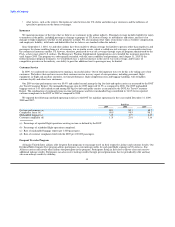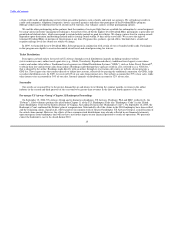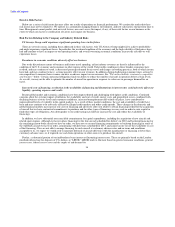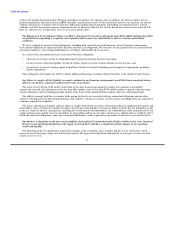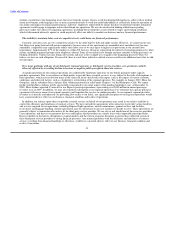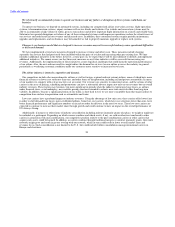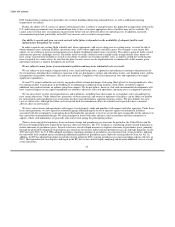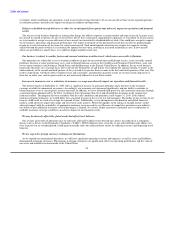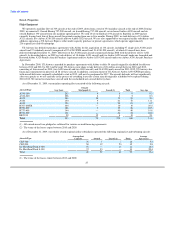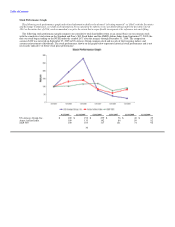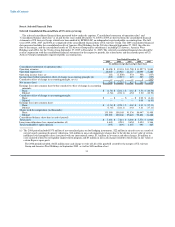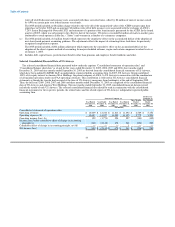US Airways 2009 Annual Report Download - page 25
Download and view the complete annual report
Please find page 25 of the 2009 US Airways annual report below. You can navigate through the pages in the report by either clicking on the pages listed below, or by using the keyword search tool below to find specific information within the annual report.
Table of Contents
While we cannot yet determine what the final regulatory programs will be in the United States, the EU or in other areas in which we do
business, such climate change-related regulatory activity in the future may adversely affect our business and financial results.
California is in the process of implementing environmental provisions aimed at limiting emissions from motorized vehicles, which
may include some airline belt loaders and tugs and require a change of ground service vehicles. The future costs associated with replacing
some or all of our ground fleets in California cities are currently not expected to have a material adverse affect on our business.
Governmental authorities in several U.S. and foreign cities are also considering or have already implemented aircraft noise reduction
programs, including the imposition of nighttime curfews and limitations on daytime take-offs and landings. We have been able to
accommodate local noise restrictions imposed to date, but our operations could be adversely affected if locally-imposed regulations
become more restrictive or widespread.
Ongoing data security compliance requirements could increase our costs, and any significant data breach could harm our
business, financial condition or results of operations.
Our business requires the appropriate and secure utilization of customer and other sensitive information. We cannot be certain that
advances in criminal capabilities, discovery of new vulnerabilities, attempts to exploit existing vulnerabilities in our systems, data thefts,
physical system or network break-ins or inappropriate access, or other developments will not compromise or breach the technology
protecting the networks that access and store database information. Furthermore, there has been heightened legislative and regulatory
focus on data security in the U.S. and abroad (particularly in the EU), including requirements for varying levels of customer notification
in the event of a data breach.
Many of our commercial partners, including credit card companies, have imposed certain data security standards that we must meet. In
particular, we are required by the Payment Card Industry Security Standards Council, founded by the credit card companies, to comply
with their highest level of data security standards. While we continue our efforts to meet these standards, new and revised standards may
be imposed that may be difficult for us to meet.
In addition to the Payment Card Industry Standards discussed above, failure to comply with the other privacy and data use and security
requirements of our partners or related laws and regulations to which we are subject may expose us to fines, sanctions or other penalties,
which could materially and adversely affect our results of operations and overall business. In addition, failure to address appropriately
these issues could also give rise to additional legal risks, which, in turn, could increase the size and number of litigation claims and
damages asserted or subject us to enforcement actions, fines and penalties and cause us to incur further related costs and expenses.
Interruptions or disruptions in service at one of our hub airports or our focus city could have a material adverse impact on our
operations.
We operate principally through hubs in Charlotte, Philadelphia and Phoenix and a focus city at Washington National Airport.
Substantially all of our flights either originate in or fly into one of these locations. A significant interruption or disruption in service at
one of our hubs resulting from air traffic control delays, weather conditions, natural disasters, growth constraints, relations with third-
party service providers, failure of computer systems, labor relations, fuel supplies, terrorist activities or otherwise could result in the
cancellation or delay of a significant portion of our flights and, as a result, could have a severe impact on our business, operations and
financial performance.
We are at risk of losses and adverse publicity stemming from any accident involving any of our aircraft or the aircraft of our
regional operators.
If one of our aircraft, an aircraft that is operated under our brand by one of our regional operators or an aircraft that is operated by an
airline that is one of our codeshare partners were to be involved in an accident, we could be exposed to significant tort liability. The
insurance we carry to cover damages arising from any future accidents may be inadequate. In the event that our insurance is not adequate,
we may be forced to bear substantial losses from an accident. In addition, any accident involving an aircraft that we operate, an aircraft
that is operated under our brand by one of our regional operators or an aircraft that is operated by an airline that is one of our codeshare
partners could create a public perception that our aircraft or those of our regional operators or codeshare partners are not safe
23



